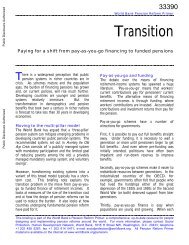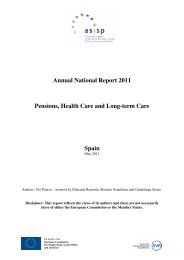Financial Sector Development in Africa: Opportunities ... - World Bank
Financial Sector Development in Africa: Opportunities ... - World Bank
Financial Sector Development in Africa: Opportunities ... - World Bank
Create successful ePaper yourself
Turn your PDF publications into a flip-book with our unique Google optimized e-Paper software.
Mobile <strong>F<strong>in</strong>ancial</strong> Services <strong>in</strong> <strong>Africa</strong>: The Next Generation 67<br />
Box 2.3<br />
Regulators Drive Interconnection: The <strong>Bank</strong> of Ghana and a<br />
National Payments Switch<br />
Start<strong>in</strong>g <strong>in</strong> 2000, Ghana <strong>in</strong>itiated various reforms of its payment system, result<strong>in</strong>g<br />
<strong>in</strong> the passage of a Payment System Act and <strong>in</strong> sett<strong>in</strong>g up a real-time gross settlement<br />
system at the <strong>Bank</strong> of Ghana (BOG). BOG then encouraged banks to establish<br />
a national switch that would <strong>in</strong>terconnect retail devices such as ATMs and<br />
po<strong>in</strong>t-of-sale (POS) devices. However, early discussions resulted <strong>in</strong> little progress,<br />
so BOG decided to go ahead anyway creat<strong>in</strong>g, <strong>in</strong> 2007, a separate subsidiary<br />
named Ghana Interbank Payment and Settlement Systems (GhIPSS). GhIPSS has<br />
the mandate of provid<strong>in</strong>g and manag<strong>in</strong>g <strong>in</strong>frastructure for electronic payments<br />
systems <strong>in</strong> the country.<br />
While procur<strong>in</strong>g the technology for a national switch, GhIPSS was drawn to a<br />
solution that offered additional features, <strong>in</strong>clud<strong>in</strong>g the issuance of smart cards<br />
that would allow biometric authentication of clients (thought to be useful for<br />
illiterate clients) as well as the capability to operate offl<strong>in</strong>e, which was useful <strong>in</strong><br />
areas without mobile coverage (at that time, only a third of the population were<br />
mobile subscribers). This new retail payment system, called eZwich, was seen as a<br />
means of enabl<strong>in</strong>g banks to bank unbanked people and people <strong>in</strong> areas beyond<br />
the reach of mobile coverage. Launched <strong>in</strong> 2008, eZwich was not fully <strong>in</strong>teroperable<br />
with exist<strong>in</strong>g ATMs or Europay-Mastercard-Visa (EMV)-compatible devices,<br />
which banks have subsequently rolled out.<br />
Draw<strong>in</strong>g on its powers as a regulator, BOG mandated that all deposit-tak<strong>in</strong>g <strong>in</strong>stitutions<br />
had to issue eZwich cards to their personal customers and had<br />
to deploy eZwich POS devices at all branches and agencies. All exist<strong>in</strong>g bank switches<br />
had to <strong>in</strong>tegrate to eZwich, and all future switches had to be eZwich- compliant.<br />
The <strong>Bank</strong> of Ghana, therefore, adopted a much stronger approach to <strong>in</strong>terconnection<br />
than do most central banks, not only fund<strong>in</strong>g and operat<strong>in</strong>g a retail payment<br />
switch but also mandat<strong>in</strong>g that banks connect to that switch.<br />
Two years after launch, the record of eZwich was mixed. All Ghanaian banks<br />
had connected to the eZwich, but not all had issued smart cards by early 2010.<br />
Despite GhIPSS’s high-profile market<strong>in</strong>g and promot<strong>in</strong>g eZwich to the public,<br />
only 323,000 cards had been issued at the end of 2009 (an estimated 3.5 million<br />
people were banked), and banks had deployed eZwich POS devices at 2,425 merchant<br />
locations. <strong>Bank</strong>s’ lack of enthusiasm about deploy<strong>in</strong>g the cards and devices<br />
reflected the lack of a bus<strong>in</strong>ess case: the cards and devices were more expensive<br />
(cont<strong>in</strong>ued next page)







